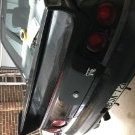Announcements
-
Similar Content
-
Latest Posts
-
Nah. You need 2x taps for anything that you cannot pass the tap all the way through. And even then, there's a point in response to the above which I will come back to. The 2x taps are 1x tapered for starting, and 1x plug tap for working to the bottom of blind holes. That block's port is effectively a blind hole from the perspective of the tap. The tapered tap/tapered thread response. You don't ever leave a female hole tapered. They are supposed to be parallel, hence the wide section of a tapered tap being parallel, the existince of plug taps, etc. The male is tapered so that it will eventually get too fat for the female thread, and yes, there is some risk if the tapped length of the female hole doesn't offer enough threads, that it will not lock up very nicely. But you can always buzz off the extra length on the male thread, and the tape is very good at adding bulk to the joint.
-
Neg, the top one is actually for the front. The sizes are 18x10.5 +18 and 18x11 +32. I measured many times but I'm sure I'll have problems as this is the thread for problems.
-
Just one thing; tapping tapered threads is tricky. Taps are always tapered and you would generally run it as far as you can, but with a tapered thread you have to stop much sooner otherwise the wide part of the taper will run in too far and you will have to thread the sensor in too far too as well (possible that it will never make a good seal) BTW nice wide wheels, I guess the top one is for the back!
-
Welp, good to know. Will have to wait awhile until steady hands with drills and taps are available. In other news, these just arrived! I will weigh them for posterity. Edit: 11kg each (or 10.9/11.1 depending on what my scale decides over multiple tests, the 18x11 don't seem to weigh noticeably any more than 10.5)
-







Recommended Posts
Create an account or sign in to comment
You need to be a member in order to leave a comment
Create an account
Sign up for a new account in our community. It's easy!
Register a new accountSign in
Already have an account? Sign in here.
Sign In Now